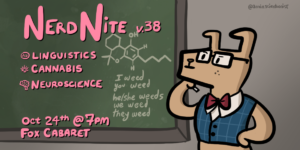In 1957, the month of October would change the world forever. On the 4th of that month Sputnik 1 was launched into orbit around planet Earth, our first artificial satellite. It orbited for three weeks among the heavens and in doing so ushered an era of human exploration of the cosmos. Does the month of October affect you in anyway? Do you think of the kids from October Sky and how Sputnik changed their lives? (Is Jake Gyllenhaal cute? Do we like him?) Perhaps you’re one that celebrates the lead up for all Hallows’ Eve? Perhaps we should heed the advice of the one Albert Einstein which on this day Oct.24th, and his theory of happiness, which he wrote on a napkin, was sold at an auction. It reads as follows:
“A calm and modest life brings more happiness than the pursuit of success combined with constant restlessness.”
With that to ponder we bring you another Nerd Nite, one which it’s co-founder Kaylee Byers makes her return. You think she’s going to talk about rats? Hell yeah. You think she’s going to tell us what she was up to in Sri Lanka? Hell to Sputnik yeah. But that’s just the start, as we have three amazing speakers to launch Nerd Nite back for another season. Let’s drink and science!
When: Wednesday October 24th; Doors @ 7, show starts @ 7:30

1. More Than Words
Sadhvi Saxena
Imagine you want to say “I love you,” but you can’t actually speak the words. Imagine you have a gluten allergy, but you can’t read the ingredient list. Imagine that this happens all of the time, despite the fact that your intelligence, thoughts and consciousness are intact. Some stroke and brain injury survivors have to deal with this frustration everyday, because they have what is known as aphasia. Aphasia hinders one’s ability to speak, write and understand both written and verbal language. This talk will introduce the audience to the diversity of aphasia, it will discuss the brain and aphasia research from a clinical perspective, and it will delve into innovative methods for aphasia treatment.
Bio: Sadhvi is a shameless lover of broken brains. For 8 years, she has been researching brain injury, dementia, and the use of noninvasive brain stimulation to study and treat brain disorders. She also develops personalized, continued, and affordable rehabilitation for speech and cognition. She received her M.S. in Clinical Investigation from Boston University and her M.H.S at the Johns Hopkins School of Public Health.
2. Cannabis
Emma Andrews
Bio: Natural Health + Cannabis Strategy Consultant, Educator & Speaker | New Product Development Professional (NPDP), Registered Holistic Nutritionist (RHN)
3. Learning the Hard Way: How the Brain Controls Movement in an Uncertain World
Amanda Bakkum
In a world that’s constantly changing, how is it that we are able to navigate our environment with relative ease? Well, our nervous system has an awesome ability to adapt how we move to the changing world around us, and it does so with seemingly little effort. It’s often only when we experience a significant change that affects or impairs our movement, that we become fully aware of how complex this system actually is. I will be discussing how the brain learns and adapts our movement to changes in the environment. And like most things in life, sometimes we have to learn the hard way.
Bio: Amanda completed her undergraduate and master’s degree in South Africa, where she specialized in physical rehabilitation and gained a great appreciation for the resilience of the human body. She later moved to Vancouver, with her dog, Dudley, to pursue her academic career aspirations at Simon Fraser University. Amanda’s chosen field for her PhD research is sensorimotor control and learning. She investigates the factors that affect how the human body adapts to our environment to gain a better understanding of how the brain learns.
While at SFU, Amanda has developed a passion for science communication and has subsequently started a neuroscience blog called Dudley Describes: Neuroscience in a Muttshell. Her blog describes basic neuroscience concepts using her dog, Dudley, to help make this field more accessible, fun and relatable to the general public. It also allows her to take copious amounts of pictures of her dog… for science, of course.
Poster by: Armin Mortazavi
IG: armin.scientoonist
